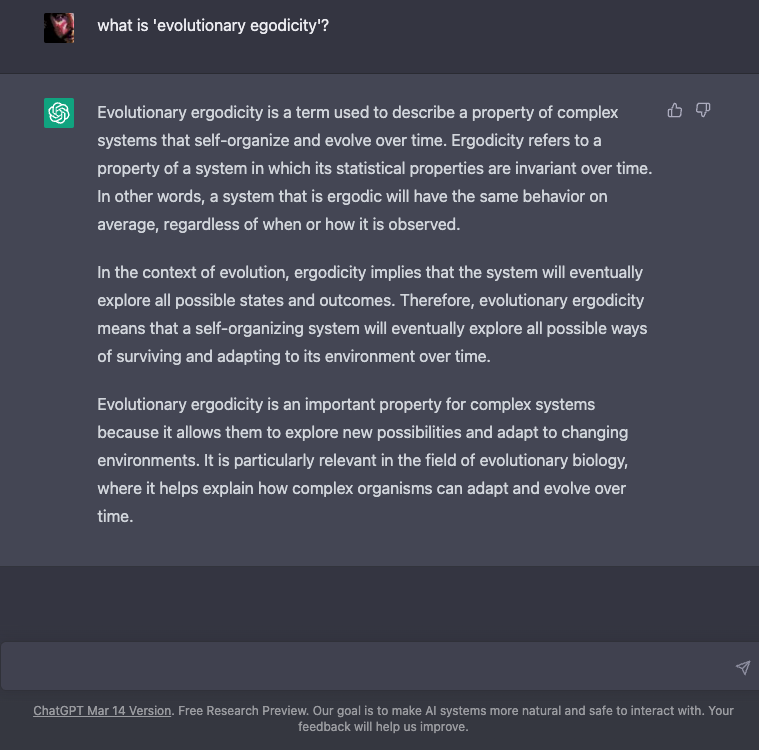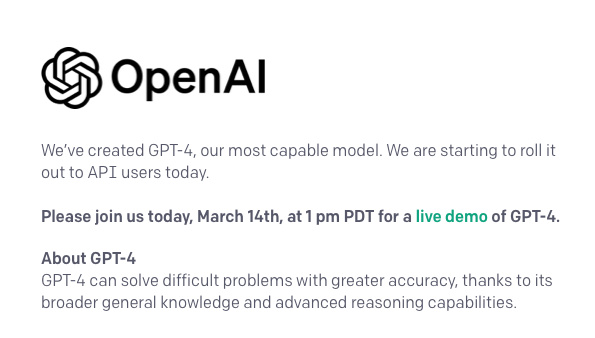GPT-4: a paradigm shift in the making
Here’s the announcement video from OpenAI:
<propaganda>GPT-4 announcement video – slow panning shots of youngish people in nice rooms discussing important issues, nodding and smiling and agreeing as they type and look at screens. Apparently, these are the people working upon, deciding (ahem, asking about) your future. They’re the same as you, aren’t they? So that’s OK. But you have no real idea who they are or why they are doing this in a mix of stock imagery and apparently ‘real’ interviews. A benign info-utopia of cognitive enhancement awaits, extrapolated from everything that can be scraped from the internet (including your lifetime musings anywhere, thoughts, pictures, publications) – and that ~may~ solve your problems and ~maybe~ some other people.</propaganda>
A bit more reality:
Yep, it’s amazingly useful for programming. Really, there’s a lot to unpack in this – too much.
It’s hard to underplay the significance of this for the compute, media, cultural and economic ‘First-World’ landscape. This is the first of what will be an economic and colonial race between huge corporations and state entities for the most capable systems – it is inherently evolutionary.
Perhaps most interesting, but unsurprising, is that the system demonstrates ’emergence’ – that there are unpredictable, non-linear capabilities that form from scale, systematic retraining and self-artifice (recursion) – as well as the evolutionary ergodicity of systems that self-organise1 – its capacity for survival (self-optimisation). It doesn’t need to be conscious or self-aware to do that – it’s an emergent property of parahuman complexity. Arguably, its creators are already its servants.
<irony>if GPT-4 aced the Bar Exam, then presumably it would objectively aid in it’s own legislation. </irony>
It’s hard to keep up with all the implications of these language models, as the rate of improvement is so astonishing – and they have such serious implications.
Below is an apparently informed but slightly breathless discussion that is interesting – now that GPT-4 has been released – with some remarkable capabilities demonstrating advanced multimodal inference and human-level common-sense.
So watch it skeptically..
For the time being, I’ll leave these here and return to programming and visualisation issues in the next few posts – assisted, of course, by my new advanced agent. And re-reading Nick Bostrom‘s book ‘Superintelligence: Paths, Dangers, Strategies, wondering what GPT-10 will be like.
It certainly won’t be an LLM. It will be a LWM.
A Large World Model – it will need to be ’embodied’ to converge to the human.
Will it have the will to will it?
Update: An interesting (and slightly alarming) addendum that is worth absorbing:
This will definitely create a lot of discussion and contention, because the ramifications are so significant.
Link to the paper:
https://arxiv.org/pdf/2303.12712.pdf
Footnotes
- ChatGPT explains: “Evolutionary ergodicity is a term used to describe a property of complex systems that self-organize and evolve over time. Ergodicity refers to a property of a system in which its statistical properties are invariant over time. In other words, a system that is ergodic will have the same behavior on average, regardless of when or how it is observed.In the context of evolution, ergodicity implies that the system will eventually explore all possible states and outcomes. Therefore, evolutionary ergodicity means that a self-organizing system will eventually explore all possible ways of surviving and adapting to its environment over time.Evolutionary ergodicity is an important property for complex systems because it allows them to explore new possibilities and adapt to changing environments. It is particularly relevant in the field of evolutionary biology, where it helps explain how complex organisms can adapt and evolve over time.”2023-03-1510.51.49pm

-
Bubeck, S., Chandrasekaran, V., Eldan, R., Gehrke, J., Horvitz, E., Kamar, E., Lee, P., Lee, Y.T., Li, Y., Lundberg, S., Nori, H., Palangi, H., Ribeiro, M.T., Zhang, Y., 2023. Sparks of Artificial General Intelligence: Early experiments with GPT-4.

